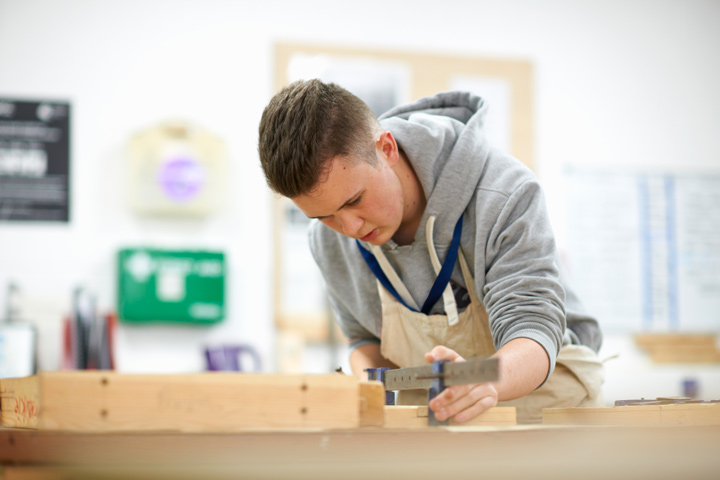Skip to main content
Start quiz
- Go to homepage
- Course areas
- Carpentry, Joinery and Furniture
- Certificate III in Cabinet Making and Timber Technology (Wood Machining)
Back to:Carpentry, Joinery and Furniture
National code: MSF30322
Certificate III in Cabinet Making and Timber Technology (Wood Machining)

Overview
About this course
Carve out your dream career as a tech-savvy wood machinist. Learn to use computer numerical control (CNC) technology and craft beautiful timber furniture for a range of industries.
Outcomes
What you'll gain
Learning outcomes
Through a mixture of theory and practical course work, learn to:
Use computer aided drawing (CAD) and computer aided machining (CAM)
Operate computer numerical control (CNC) technology
Work with timber, veneers, particle boards and synthetic woods
Mark out, cut and shape timber products
Fit hinges, locks, catches, drawers and shelves
Produce machine tooling such as cutters and knives
Course outcomes
Learn core skills that prepare you for opportunities in your chosen field.
A nationally accredited qualification at certificate III level
The skills to work from detailed drawings and specifications to make furniture
Experience using machinery to make a range of quality products such as window frames, stepladders, coffee tables, magazine racks and mouldings
Strong pathways to continue your study and enhance your career opportunities
Suitability
Is this course right for you?
Entry requirements
This course requires evidence of previous experience or study before you can enrol.
Apprenticeship
Be employed as an apprentice in the industry
Register with an Apprenticeship Connect Australia Provider (ACAP) who will support your application
Non-apprenticeship
Non-apprenticeship pathways for trade-related qualifications allow you to have your industry skills assessed through recognition of prior learning (RPL) and undertake gap training to gain a trade qualification. To take this course as a non-apprenticeship, you must:
Be at least 21 years of age, as evidenced by photo identification
Have at least 2 years of work experience in this occupation or trade, as evidenced by employee records such as your resume and/or letters from your employers
Be currently employed in the relevant industry, as evidenced by a letter from your employer
This course may be offered as a non-apprenticeship. Check your preferred campus page for more information.
Completion requirements
During your study you'll need to provide your teacher with the following evidence:
Entry recommendations
To be prepared for this course, we recommend that you have:
A genuine interest in woodworking and machinery
Some experience handling tools and equipment
An intermediate level of fitness to manage the physical demands of the role
Good computer and tech skills
Basic maths and communication skills
The ability to work as part of a team
You can plan your work and try to solve problems on your own.
You can understand documents you see often in everyday life.
You can write short sentences or lists to share information
You can speak clearly and explain your thoughts in a group.
You can solve maths problems you often see in real life.
You can use email, search the internet, and open files.
We tailor our courses to meet local community needs, so some campuses may have extra entry requirements. Check your preferred location for details. Need help preparing? Contact us for support.
Find Your Fit
This simple tool guides you to a suitable course level based on your foundation skills and confidence.
Pathways
Future career and study options
Career pathways
Our graduates go onto roles like: woodmachinist in the furniture, forestry, kitchens and bathroom, flat panel and windows and joinery industries.
Study pathways
Take your study further with other courses offered at TAFE NSW:
Previous study0 Courses
Begin here to gain experience and confidence in this study area.
The Certificate III in Cabinet Making and Timber Technology (Wood Machining) does not have any pre-requisite courses.
Further study2 Courses
Advance your skills to take your career to the next level
Related study0 Courses
Learn core skills that prepare you for opportunities in your chosen field.
The Certificate III in Cabinet Making and Timber Technology (Wood Machining) does not have any related courses.
Your experience counts
At TAFE NSW, we recognise your previous study and work experience. You can apply for recognition of prior learning or a credit transfer with any of our courses. If you're successful you'll get your qualification faster.
Units
Units taught in this course
Courses are made up of a combination of both core and specialty units. In the Certificate III in Cabinet Making and Timber Technology (Wood Machining) qualification, you’ll need to successfully complete 25 units of competency, including 8 core and 17 speciality units.
Please note, not all specialty units are offered at every TAFE NSW location. It is highly recommended that you check with your preferred campus for information about the specialty units offered at that location.
Core units - 8
Core units are central to the job outcomes of a particular industry or occupation. These are the units industry has agreed are essential to be capable and qualified at a particular study level.
Make measurements and calculationsMSFGN2001
Participate in environmentally sustainable work practicesMSMENV272
Communicate in the workplaceMSMSUP102
Read and interpret work documentsMSFGN3005
TAFE NSW services
Facilities and support
TAFE NSW provides support services across all campus locations and online. Whatever your needs or circumstances, we have the people, resources, counselling and facilities to support you in focusing on your studies.
TAFE NSW Disability Support Service
TAFE NSW Language, Literacy and Numeracy (LLN) support
TAFE NSW Aboriginal Support; Learner support (ABE)
TAFE NSW Careers, Counselling and Pathways Service
TAFE NSW Libraries
Scholarship programs - be supported as you explore your talents and fulfil your potential
Read&Write literacy and study support software is available free for all TAFE NSW students to use while studying on campus and at home
LinkedIn Learning - an online resource which offers innovative courses and tutorials to improve your personal and professional skills
Student associations - get social with our student community
Study options